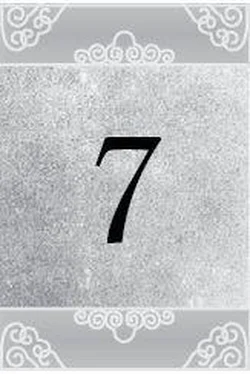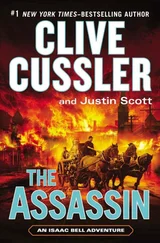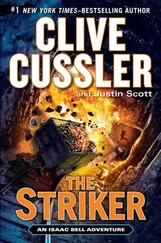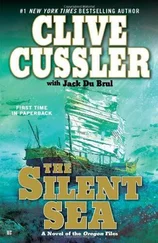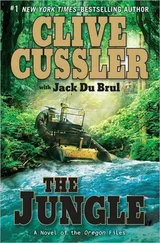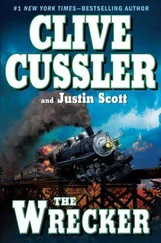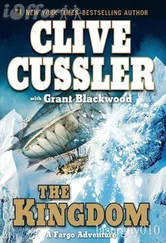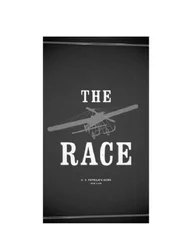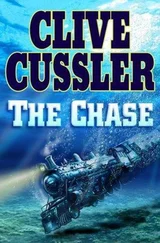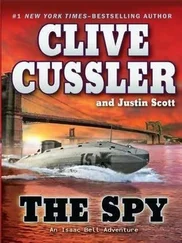“Here are a thousand people who had a secret. Not one of them told?”
“Got to hand it to the Huns,” she said. “They knew it’s hard to talk when you’re headless. We didn’t have that option in sixth grade.”
“Of course. But even if these men all knew they were going to be killed, they still had relatives they would want to help. I can believe they were all fanatically loyal to Attila, but by then he was dead. Without Attila, the Huns were a loose federation. Didn’t even one of these guys hedge his bets?”
“Apparently not or we would have a history course about some other guy who came onto the scene with a boatload of treasure.”
“I suppose you’re right,” Sam said. They walked along the rows of skeletons, passing dozens, then more dozens, a hundred.
“Wait,” said Remi. “Take a look at this one.”
Sam joined her beside the skeleton. The skeleton had a gold ring around his neck like a Celtic torque. Beside him was a sword with a scabbard with silver mountings. He was wearing a vest that had been made of sheepskin. There were but a few wisps of the shaggy wool left on the outside, and the whole inner leather surface had turned a deep brown.
Through the rib cage and past the backbone, they could see something that looked like rows of designs and, below it, a large and elaborate shape. Remi said, “Doesn’t that look like print? And surely that’s a picture of something.”
“Kind of odd,” said Sam. “While he was wearing the vest, you wouldn’t be able to see the designs.”
“Priscus wrote that they wore their leather clothes until they fell off them. The only time you’d see this is after he was a skeleton.”
Sam raised his hand in the air. “Albrecht!” he called. “Can you spare a minute?”
Albrecht came from across the big room and joined them. He looked down. Then he knelt beside the skeleton, moving his head to see the vest through the ribs. Very faintly he breathed, “Oh, no.”
Remi said, “Doesn’t it look like writing?”
“It is writing,” said Albrecht. “We’ve got to get the vest off him so we can see all of it.” They carefully lifted the upper part of the skeleton, leaving the severed head on the tarp. While Sam held the torso, Remi and Albrecht slipped the vest down off the shoulders and then the arms. They laid it out on the tarp. Albrecht looked at the shapes closely.
“It’s Gothic. It’s an early eastern Germanic language, probably what half of Attila’s troops spoke.”
“Can you read any of it?”
“Quite a lot of it, actually,” he said. “There was a nobleman named Ulfilas who commissioned a translation of the Bible just about when Attila died, so we know a lot of the vocabulary and structure. And it has a lot of similarities to other Germanic languages. In English you say have . In German it’s haben . In Gothic it’s haban . Generally, Gothic retains a z that German lost. Things like that.”
He read. “‘Two days and a half north, one half day west. He’s where the fourth-night moon is widest.’ Fourth-night moon. I have no idea what that means.”
Sam said, “I do. The moon is on a twenty-eight-day cycle. If you start a cycle with the new moon or the full moon, the fourth night is always a crescent.”
“Look at the picture,” said Albrecht.
“That’s the waxing crescent,” Sam said. “The left edge is lit up.”
“Do you think it’s a calendar?” Albrecht said.
“No,” said Remi. “This guy was the cheater. He didn’t get to talk, but he made a map. The crescent is the shape of the bend in the river that they cut off when they diverted it. He’s telling us where Attila is buried.”
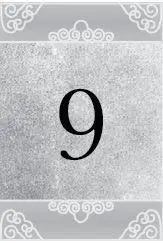
SZEGED, HUNGARY
SAM AND REMI WERE IN THEIR HOTEL SUITE, AND SELMA Wondrash was on Remi’s computer screen. “Wendy and Pete and I have done the comparisons and angle measurements and calculations many times and we’re sure that we’ve found the spot that was indicated on the vest. The Roman soldiers of that era could cover twenty-five miles in a day on foot. The Huns were horsemen. When they wanted to, they could probably do twice that distance. But this time they had to transport a heavy load, so we’ve brought the estimate back to about twenty-five. That means we have a distance north along the river of sixty miles and a distance west of twelve miles. Using aerial photography and satellite images, we do find a dry channel with a crescent-shaped accumulation of alluvium on its west, or outer, side. And the later shortening and straightening of the Tisza left the spot not only dry but nowhere near the modern course of the river.”
“You’re using the same reasoning we are,” said Sam. “The cargo must have weighed several tons, so it was loaded on a huge wagon, probably drawn by a herd of oxen. They would have gone across the plains east of the river, where they didn’t need a road, and probably stayed out of sight of the river until the end. In fact, they probably had groups of outriders on all sides to be sure nobody came close.”
“Agreed,” said Selma. “So when we compare the map on the vest with the aerial photographs, we get a spot at 46° 25' 55" north and 19° 29' 19" east. That’s about a hundred thirty miles south of Budapest.”
“What’s there?”
“Well, it could be worse,” she said. “It’s not a cathedral or a nuclear power plant. It’s the Grape Research Institute, in Kiskunhalas. The halas part means ‘fish.’ In medieval times the town was surrounded by lakes, presumably fed by the river. They’re long gone, but the memory lingers on, as does the sandy soil, which is terrific for growing wine grapes.”
“How does a modern person get there?”
“From Szeged, you take Route 55 until you reach Route 53, then switch.”
“We’ll let you know when we’ve figured out how to do this,” Sam said. “We’ve got a whole lot of activity going on at the Tisza River to make Bako’s men think we’ve already found the tomb underwater.”
“If I were you, I’d keep that up,” she said. “Arpad Bako has been investigated for three murders besides Tibor Lazar’s son. And I wish you good hunting. If anything comes to mind that I can do, give me a call.”
“We will.”
The next morning, Sam and Remi went down to the Tisza River as usual and spent most of the day diving to keep up the pretense that they’d found something. It wasn’t until after dark that Sam, Remi, and Albrecht saw Tibor arrive in an eight-year-old Mercedes sedan. “Is this your car?” Sam asked.
“My personal car?” said Tibor. “No. I own it, but we use it as a cab. We have a number of regular customers who don’t want a taxi with a sign on it. We take them to restaurants and parties. In Hungary, the legal amount of alcohol you can drink and drive is zero, so they need to be driven. Me, I walk. I don’t need a car.”
Sam loaded the metal detector, three short-handled spades, and night vision goggles into the trunk and climbed into the sedan with the others. Tibor drove them north along the river, staring intently into the rearview mirror at times.
“Are we being followed?” asked Remi.
“I don’t think so,” Tibor said. “It’s hard to tell on these country roads, though. If somebody is behind you when you leave one town, he’ll stay behind you all the way to the next town. And it’s dark, so all you can see is his headlights.”
“But you don’t think anyone is following us?”
“No. The one who’s been behind us all this time drives like my grandmother. Anybody we have to worry about would be bold and crazy.”
Читать дальше
